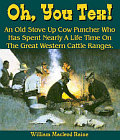|
Texas Another World
Texas Tales
|
Bestsellers
Texas Tales
Products
- per page
The report of Blue Bonnet's ranch party had spread like wildfire through the town, and the going away of so many of its most prominent citizens to far-off Texas, had aroused quiet Woodford to a pitch of excitement equalled only by that of a prohibition election, or a visit from the President.
In the series commencing with the present volume GUSTAVE AIMARD has entirely changed the character of his stories. He has selected a magnificent episode of American history, the liberation of Texas from the intolerable yoke of the Mexicans, and describes scenes quorum pars magna fuit.
Long time since this hand hath penned a preface. Now only to say, that this romance, as originally published, was written when the author was suffering severe affliction, both physically and mentally-the result of a gun-wound that brought him as near to death as Darke's bullet did Clancy.
This was not the first time he had been broke. On the contrary, during his younger days he had more than once found himself in that condition and had looked upon it as an exciting experience, as a not unpleasant form of adventure. To be strapped in a mining camp, for instance, was no more than a mild embarrassment. But to find oneself thirty-eight years old, friendless and without funds in a city the size of Dallas-well, that was more than an adventure, and it afforded a sort of excitement that he believed he could very well do without.
Primarily the struggle of the Texans for freedom did not form a part of our war with Mexico, yet this struggle led up directly to the greater war to follow, and it is probably a fact that, had the people of Texas not at first accomplished their freedom, there would have been no war between the two larger republics.
Apart from the thrilling interest of Aimard's new story, which I herewith offer to English readers, I think it will be accepted with greater satisfaction, as being an historical record of the last great contest in which the North Americans were engaged. As at the present moment everything is eagerly devoured that may tend to throw light on the impending struggle between North and South, I believe that the story of "THE FREEBOOTERS," which is rigorously true in its details, will enable my readers to form a correct opinion of the character of the Southerners.
Away to her left lay the yellow flood of the Rio Grande, but the woman, though tempted to swing in that direction, knew better than to yield. At least twenty miles of barrens lay between, and she told herself that she could never cover such a distance. No, the water-hole was nearer; it must be close at hand.
Together, man and mount made a striking picture; yet it would have been hard to say which was the more picturesque-the rider or the horse. The latter was a splendid beast, and its spotless hide of snowy white glowed in the rays of the afternoon sun. With bit chains jingling, it gracefully leaped a gully, landing with all the agility of a mountain lion, in spite of its enormous size.
It may seem strange to you that out of all the stories I heard on the Rio Grande I should choose as first that of Buck Duane-outlaw and gunman. But, indeed, Ranger Coffee's story of the last of the Duanes has haunted me, and I have given full rein to imagination and have retold it in my own way. It deals with the old law-the old border days-therefore it is better first.
Day was breaking in the Panhandle. The line-rider finished his breakfast of buffalo-hump, coffee, and biscuits. He had eaten heartily, for it would be long after sunset before he touched food again. Cheerfully and tunelessly he warbled a cowboy ditty as he packed his supplies and prepared to go.
I can truthfully say that my entire life has been spent with cattle. Even during my four years' service in the Confederate army, the greater portion was spent with the commissary department, in charge of its beef supplies. I was wounded early in the second year of the war and disabled as a soldier, but rather than remain at home I accepted a menial position under a quartermaster.
The horseman rode slowly toward the west, stopping once or twice to examine the wide circle of the horizon with eyes that were trained to note every aspect of the wilderness. On his right the plains melted away in gentle swell after swell, until they met the horizon. Their brown surface was broken only by the spiked and thorny cactus and stray bits of chaparral.
Based upon the Texan struggle for liberty against the power of Mexico, this revolution, epic in its nature, and crowded with heroism and great events, divides itself naturally into three parts.
Exactly twenty minutes after young Benton dismounted from his big rangy black before the door of a low adobe saloon that fronted upon one of the narrow crooked streets of old Las Vegas, he glanced into the eyes of the thin-lipped croupier and laughed. "You've got 'em. Seventy-four good old Texas dollars." He held up a coin between his thumb and forefinger. "I've got another one left, an' your boss is goin' to get that, too-but he's goin' to get it in legitimate barter an' trade."
Taken From Real Life from An Old Stove Up Cow Puncher Who Has Spent Nearly A Life Time On The Great Western Cattle Ranges. "My excuse for writing this book is money-and lots of it. I suppose the above would suffice, but as time is not very precious I will continue and tell how the idea of writing a book first got into my head.
- per page























